Marijuana vs Cigarettes: Comparing the Effects


The arguments about what’s worse, cigarettes or weed, continue unabated, especially now when more and more states legalize medical and recreational use of pot. Some can say that smoking is always smoking, and it is a huge harm to everyone’s health no matter what they use — marijuana or tobacco. However, it is not true. These substances have different chemical compounds, and thus, they affect our bodies differently. In this article, we would like to give you detailed information on both and explain how they can influence your well-being. Hopefully, it can help you choose what’s better for you.
There is a very popular opinion among those who fought against smoking tobacco and achieved huge success in the USA in recent years that the legalization of marijuana can bring all their effort to naught. They claim that smoking should be forbidden in public places for all, regardless of the substance people consume, as it is hazardous not only for those who smoke, but also for people who are around. Well, this can be the first and the biggest advantage of weed — you can consume it in many forms, not only cigarettes. These products have less negative impact on human health than smoking. Still, within this review, we’ll take joints and cigarettes and see how they differ from each other.
Comparing the Dangers of Weed & Tobacco
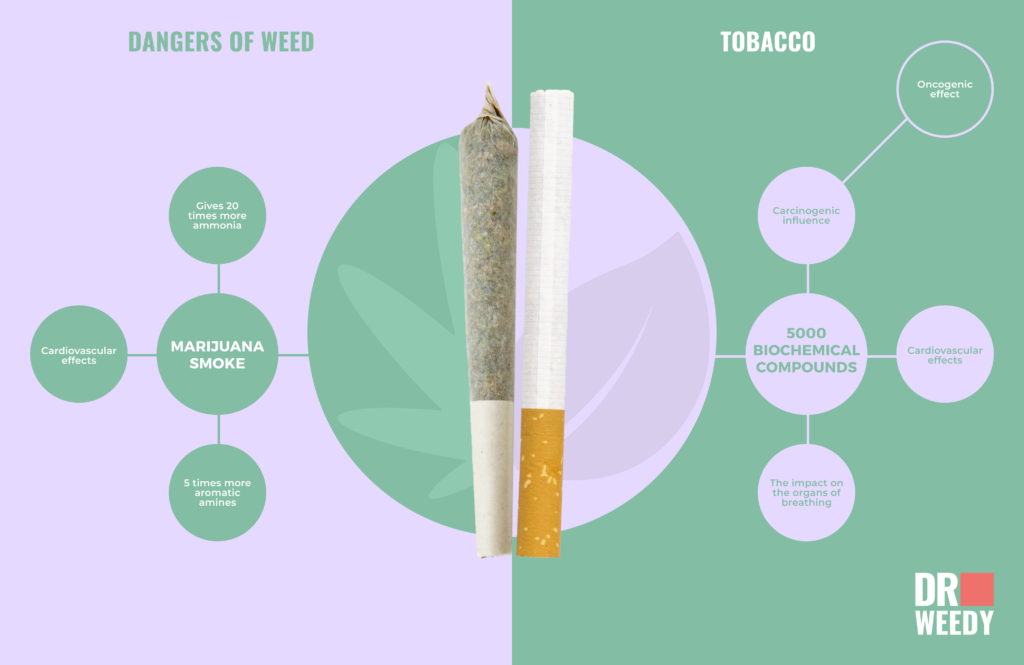
The article in the Journal of Environmental Research and Public Health from February 2011 says that a regular cigarette contains over 5,000 biochemical compounds. Almost 100 of them provide various effects on human bodies. These effects can be divided into three groups:
- carcinogenic influence;
- the impact on the organs of breathing;
- cardiovascular effects.
Obviously, the most frightening agents are tumorigenic ones. Mostly, they are contained in tar. They include various polycyclic hydrocarbons (PAHs), aromatic amines, aldehydes, benzene, amines, chlorides, and even cadmium with polonium-210. When you read this, you wanna quit smoking, right? Let’s not forget that there are so-called mainstream and sidestream smokes. The first one is when users inhale directly from the cigarette and the second one is when you inhale the smoke that comes out of the tip . The latter one seems to be even more dangerous, as the concentration of hazardous elements in it is higher.
It seems that the answer to the question “is tobacco worse than weed” has been found. Nope. Unfortunately, Mary Jane also produces tar when smoked, which includes almost the same elements as tobacco. And there is no clear-cut answer which one does less harm. For example, a study of Canadian researchers shows that when comparing smoking joint vs cigarette, cannabis gives 20 times more ammonia than tobacco, and up to 5 times more prussic acid, nitrogen oxide, and various aromatic amines. At the same time, there are fewer PAHs in marijuana mainstream smoke. Sidestream smoke, however, is much more concentrated.
Like cigarettes, joints pose great danger to lungs, heart, brain, and they can cause the development of malignant tumors.
Some effects are more evident in marijuana smoking, others manifest themselves higher in tobacco. For example, the oncogenic actions of marijuana are proven to be lower than those of tobacco, but the heart suffers more when people smoke weed. Basing on the existing scientific evidence, we’ll see what systems are damaged and when, and what are the biggest risks of pot and baccy. Some of the studies are rather controversial, still they provide data that can help us see the difference between two products.
Cancer Risks
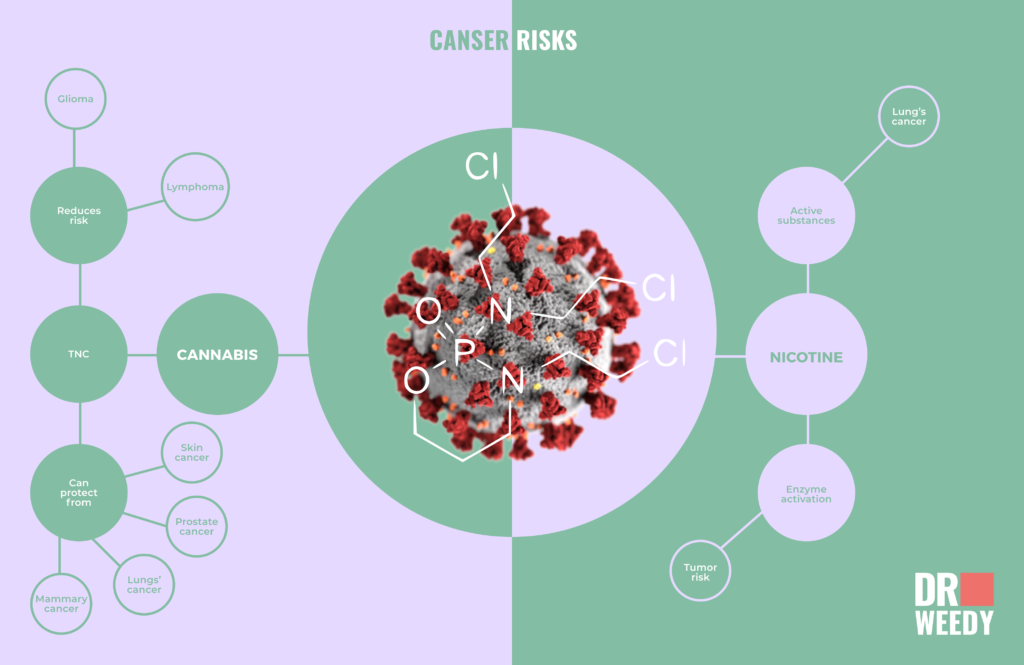
A molecular biologist from the University of Colorado Robert Melamede examined the influence of both substances and tried to understand what is more harmful, cigarettes or weed. He came to the conclusion that cigarettes cause more lung cancer deaths than joints. His research emphasizes that despite the huge similarity in the chemical content, two products have significant differences — their active ingredients. Nicotine for cigarettes and cannabinoids for weed, to be more specific. These bioactive agents produce different pharmacological effects, and this may be the reason for tobacco has higher tumor-causing risks.
Obviously, airways and lungs are the first to be damaged by smoking. It also enhances the chances to develop cancers of the colon, liver, and rectum. The most active promoters of oncology diseases are PAHs, especially benzopyrene. It is interesting, the content of PAHs in marijuana is higher, and it seems that weed is more dangerous when talking about cancer, but it is not true.
The studies show that cannabinoids present in pot, THC to be more specific, can inhibit the harmful actions of carcinogens we inhale with smoke. Without going into complex details, cannabis may protect from breast, lung, prostate, and skin cancer, it mitigates the risks of leukemia, glioma, and lymphoma. On the contrary, nicotine activates enzymes that may induce cancer and increases the danger of malignant tumors.
According to another researcher, who compared cigarettes vs weed, was Mark Pletcher, a Doctor of Medicine from the University of California. He and his team analyzed the information from over 5,000 American smokers regarding their lung function. They measured the speed of the airflow inhaled and exhaled by the examinees, and the volume of their lungs. The results were entirely to be expected, as Pletcher said, and regular tobacco users had significantly reduced capacity.
All the more, the correlation between lung damage and smoking tobacco was directly proportional — the more patients smoked the more significant ailments they had. The same could not be said about the joint users. The volume and speed of the inhaled and exhaled air was enhanced with the increased consumption of marijuana. However, you should know that these findings are only true if a certain level of cannabis use is not exceeded.
One of the main differences between cigarettes and joints is the frequency of use. Tobacco smokers may have more than 20 cigarettes a day, while weed is smoked occasionally, for fun or for medical purposes. The scientists suggest that the heavier consumption of cannabis, especially in smoking forms, may lead to serious pulmonary dysfunctions, among others.
The article of the Alcohol and Drug Abuse Institute of the Washington University says that regular and binge marijuana smoking is associated with certain respiratory disorders, such as:
- coughing;
- labored breathing;
- inflammation;
- sputum discharge, etc.
Long-term use of pot can also lead to damage to the airways and lungs.
Heart and Vessels Health
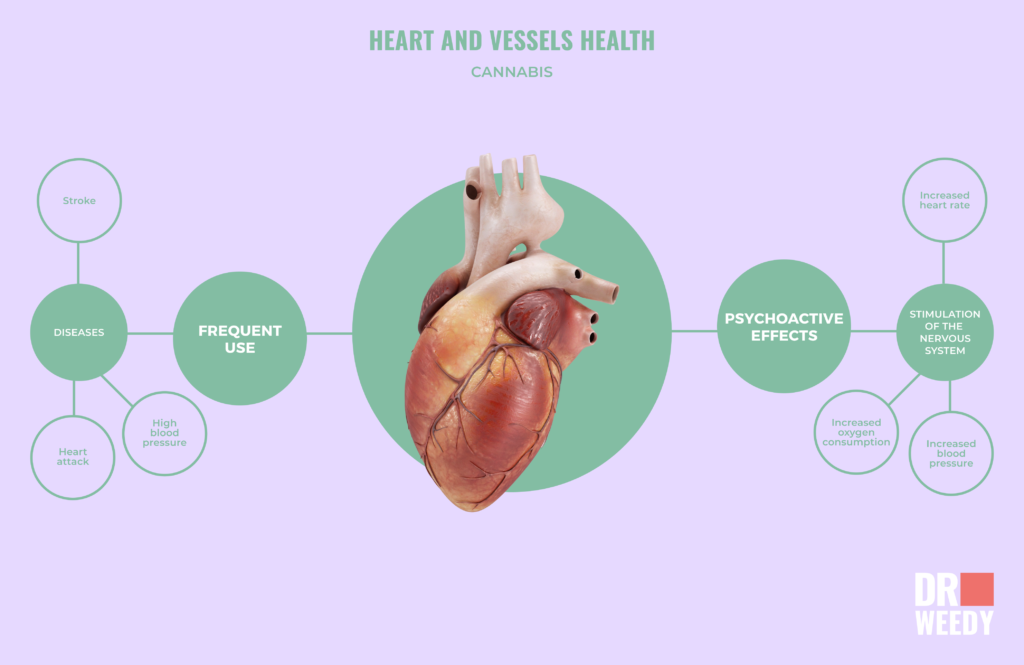
Another important factor we have to take into account when choosing between cigarettes vs marijuana is our cardiovascular health. And in contrast to previous two chapters, here weed tends to lose. The research of the Georgia State University reveals that weed can impair the functioning of our heart and vessels, lead to high blood pressure, stroke, and heart attacks. Special attention should be paid to the risks related to high blood pressure, because the research showed that those who smoke marijuana are 3 times more likely to die of this malady.
This effect may be explained by the psychoactive effects of cannabis — it stimulates our nervous system, thus increasing the heart rate, oxygen consumption, and eventually the blood pressure. Doctors say that with the growing popularity of marijuana in youth and its legalization, we should pay more attention to the health issues, as heart attacks and angina are a huge problems in the USA. The good news is that no relation between the cerebrovascular and heart diseases and weed smoking were found during this research. Still, when deciding which is worse for your heart, remember that you have to be very careful with pot.
Mental Health
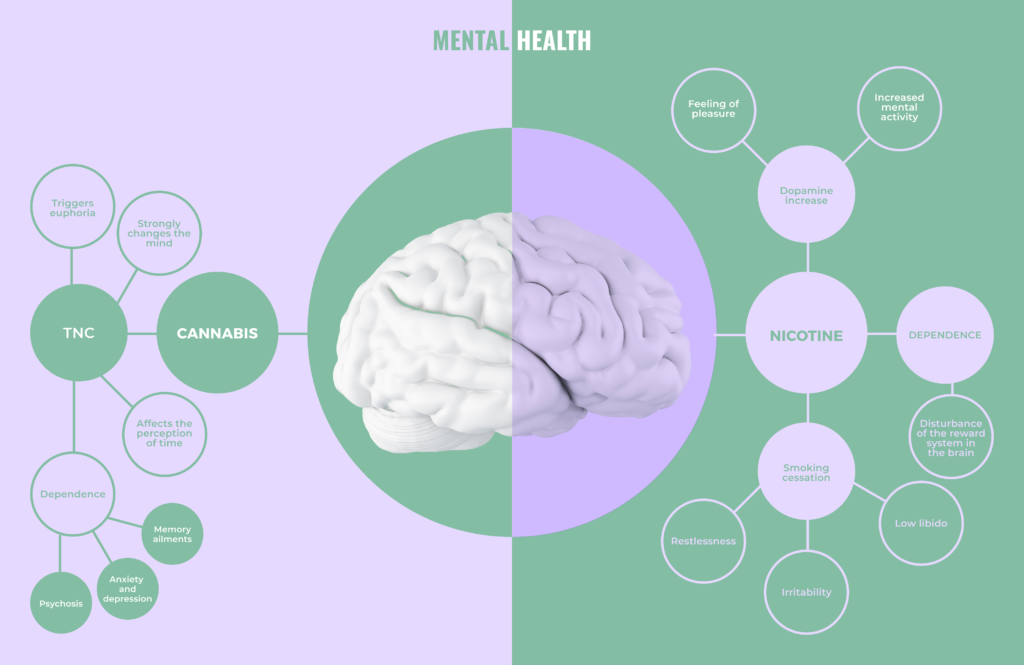
This one is very essential. Smoking is one of the fastest and most efficient ways to bring drugs to the central nervous system. For example, nicotine affects the brain almost at the same moment a user inhales it. The same goes for cannabinoids. The psychoactive compounds of cigarettes increase dopamine, which leads to higher mental activity and feeling of pleasure. However, regular nicotine use can make a person addicted to it, and breaks the natural reward system in the brain. The common adverse effects of binge tobacco smoking, and especially of the withdrawal syndrome when someone tries to quit, are:
- hallucinations;
- memory ailments;
- cognitive dysfunctions;
- psychosis;
- anxiety and depression.
THC present in marijuana produces stronger psycho emotional effects and alters our cognition greatly. This cannabinoid causes euphoria, affects our perception of time and space, impairs coordination and memory. Thus, the consequences of the long-term marijuana smoking are:
- hallucinations;
- memory ailments;
- cognitive dysfunctions;
- psychosis;
- anxiety and depression.
Obviously, such serious effects cannot be ignored when making a choice between pot and baccy.
Different Products — Different Effects
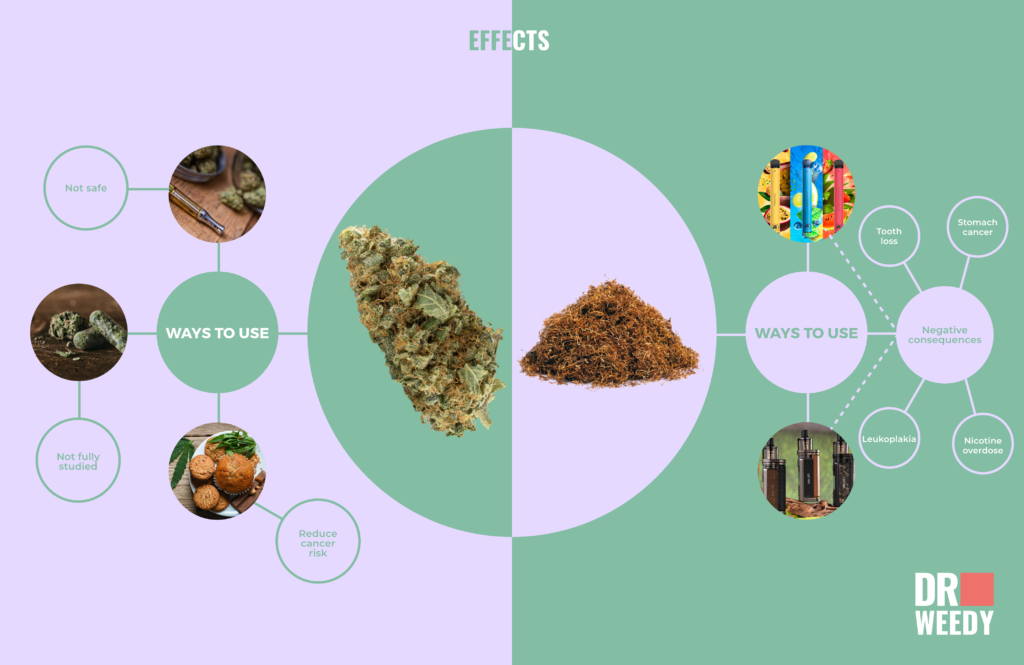
Many people do not like smoking itself and look for other ways of tobacco and marijuana use. When comparing what is more popular, cigarettes or marijuana, we must remember that the latter can be consumed as edibles, pills, etc. Cookies, candies, chocolates, lollipops, and chewing gums with weed are very popular, and they do not harm lungs, which decreases the risk of cancer to zero.
Vaping, on the contrary, is still dangerous, but far less than usual smoking. This way of administering cannabis involves making a solution or highly concentrated oil that contains THC, then heating it to vaporize, and inhaling the vape. There are two methods of vaping: using vape-pens and dabbing. Both of them have adverse respiratory effects, but are not as harmful as joint smoking. Nevertheless, the American Lung Association warns marijuana users that these methods are comparatively new, and there is no valid data on the negative consequences they cause. Scientists need more time to observe users and study effects of vaping to come to any conclusion.
As for the medicines that contain cannabis, they are also yet to be fully studied, however, they seem to be relatively safe. Lots of pharmacological companies and institutes are working on developing new medications based on the products of marijuana. You can find the following forms of cannabis drugs:
- pills and capsules;
- lotions and creams;
- extracts, including oil, wax, and shatter;
- and patches.
Side effects of medical cannabis are mostly related to brain functioning, as it first of all alters cognition and emotions.
Tobacco can be usedseveral ways, too. You can chew or sniff it, along with smoking. But unlike marijuana, the negative effects of these forms of tobacco seem to be more dangerous than those of smoking. For instance, oral use may lead to:
- various oral cancers;
- tooth loss;
- nicotine overdose;
- stomach cancer;
- leukoplakia;
- serious problems with gums, etc.
Sniffing the dry snuff leads to highly dangerous changes in nasal area.
Statistics
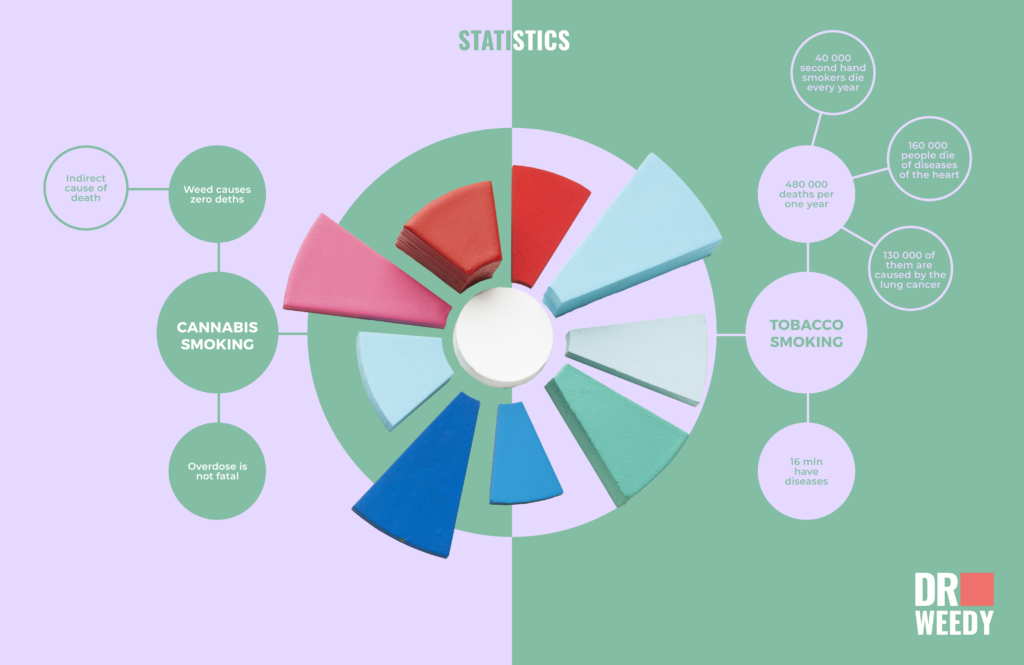
Let’s look at the statistics. Smoking tobacco causes nearly 480,000 deaths per one year:
- almost 130,000 of them are caused by the lung cancer;
- 36,000 — by other cancers;
- 160,000 people die of diseases of the heart and vessels;
- respiratory diseases take nearly 113,000 lives yearly;
- over 40,000 secondhand smokers die every year.
Men die more frequently than women, almost 300,000 from the total year count. Other numbers are even more frightening — we have to add 30 seriously ill people to every dead smoker, as least 16 million Americans have a smoking-associated disease.
What about marijuana? Most experts say that weed causes zero (!!!) deaths. Overdose is not fatal, and there is no valid information about the connection between pot smoking and cancers, heart attacks, strokes, etc. It seems that it is completely safe. Of course, it is not true as there are certain risks related to weed. At least, there are more fatal car accidents with cannabis-positive drivers. However, the reasons for weed-associated deaths are commonly indirect.
Conclusion
Now we have enough information to decide is weed better than tobacco. In many aspects, it is. However, only at reasonable limits, as we do not know what the future holds for those who use marijuana, especially joints,. One more concern about weed is that it is highly addictive, and it causes serious cognitive alterations. However, the risks of regular cigarette smoking look more frightening, as it can result in terrible diseases and eventual death.



























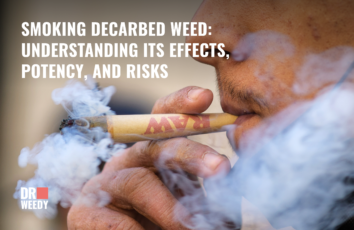
I used to smoke tobacco I stopped as I was having issues breathing,
some years later I started smoking weed, I never have any issues with breathing as I only do it later before bed to help sleep and it does, now I don’t have to take any sleeping pills or even pain pills as it helps my arthritis pain.
I don’t recommend any smoking at all as it really is not a good thing to do!
overall at age 75, I hope to live another ten years and according to my doc no reason I cannot.
please do not drive after smoking anything, I noticed when smoking tobacco
I would feel a little heady first thing in the am.
Someone claimed cannabis contains tar……
Take birch-leaves and smolder them….. There will be tar…
Now do this with some cannabis-leaves (no need to waste buds) you will see no tar.
If you smoke the green stuff in a glass pipe look for black stuff (dont mean the ash)
Dont makes sense